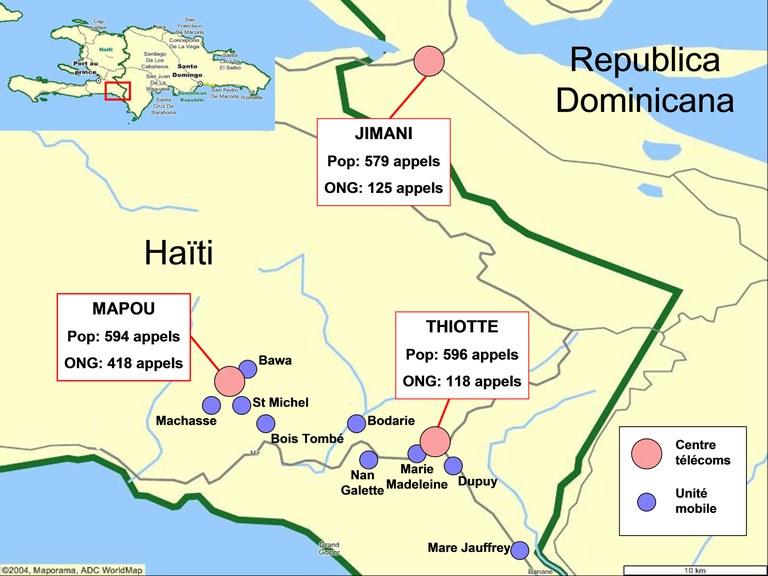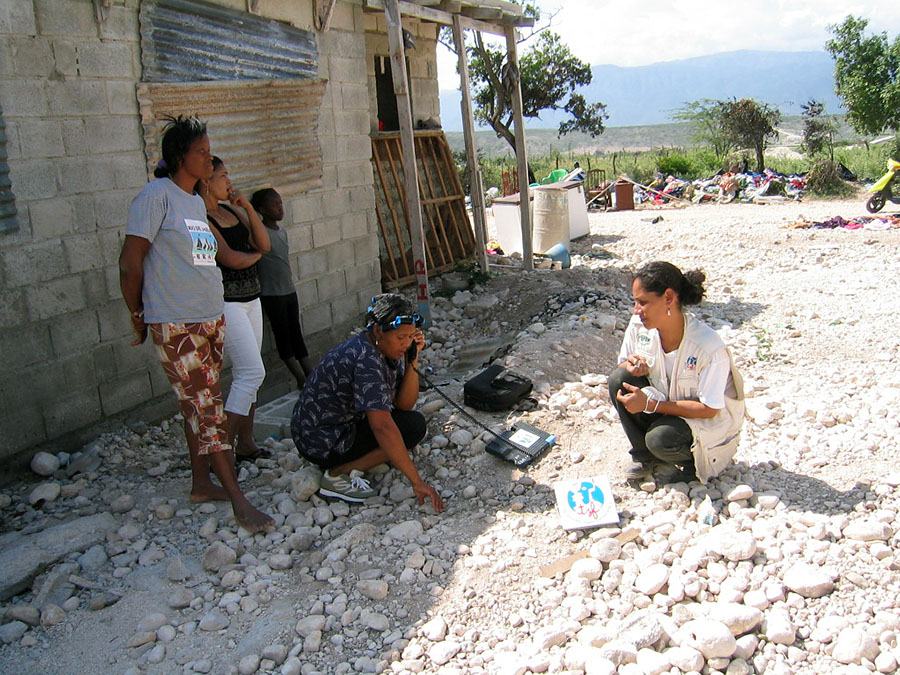Caribbean Floods
Context: Floods
Start date: 25/05/2004
End date: 21/06/2004
Areas of intervention:
- Jimani, Dominican Republic
- Mapou, Haiti
- Thiotte, Haiti
Activities:
- Telecoms centres
- Humanitarian calling operations
3 telecoms centres
50 NGOs beneficiaries of telecoms support
2,311 family beneficiaries of calling operations
Context
Heavy rains from 23rd to 25th May on Hispanola Island caused major flooding in Santo Domingo and Haiti.Deforestation and poverty made even worst the consequences of the disaster. Rivers, mudslides and stone slides swept away human beings, cattle and houses.
The official toll showed 2,000 deaths and hundreds of missing persons and tens of thousands of displaced on both sides of the border. More than 5000 houses were destroyed and road infrastructure was badly damaged. Telecommunication network is badly damaged in Jimani, phone and electrical network are out of order. Data transmission had never existed.
A large number of NGOs, organisations, and local forces responded to the emergency and were mobilised on affected areas. The affected areas were completely isolated, access was very difficult; in Haiti, the area could be reached only by helicopter.
Deployment
With the support of the European Civil Protection and Humanitarian Aid Operations (ECHO), Télécoms Sans Frontières decided to intervene as soon as possible in the Dominican Republic in Jimani, as well as in the cities of Mapou and Thiotte in Haiti. Four technicians, deployed from the America base as of 25th May, provided effective field presence at the Emergencia Operaciones Centre in Jimani the following day.
Telecoms centres
Upon arrival, TSF conducted a telecom needs assessment with the relief agencies and the population to identify priority areas.
On the morning of 27th May, TSF installed in Jimani a first telecom centre at the city hall converted into a coordination centre of the Dominican government institutions. Three high-speed Internet connections, three satellite phones and computer equipment (computers, printers, fax machines, etc.) were made available to local and international relief organisations and local authorities to facilitate coordination and logistical implementation of their operations.
Two technicians left for Mapou in the first helicopter of the federation available on 30th May, where they set up a second telecom centre. The needs were much higher in Haiti, but many areas remained very difficult to access.
A third telecom centre was set up in the city of Thiotte. These communities being among the most isolated, TSF decided to create a back base mainly for humanitarian calling operations among the population.
Relief operations and delivery of humanitarian aid to the Dominican Republic and Haiti were delayed by inaccessibility to affected areas. The telecom resources put in place by TSF allowed ensuring the logistics of all the organizations on the spot:
- Logistics of all shipments and receptions of humanitarian aid;
- Rotation of helicopters;
- Coordination and calls from all NGOs and institutions present;
- Loan of telephones during NGO field trips;
- Situation assessments and monitoring of information;
- Food distributions;
- Convey information to the international media (send reports and photos in real time).
TSF’s connectivity also provided valuable support to the medical activity for:
- Urgent requests for medicines and medical equipment;
- Daily epidemiological monitoring (epidemiological alert system);
- Medical evacuations on Port-au-Prince;
- Coordination with the hospital centre in Thiotte;
- Ensure the assessment of malnutrition by the MUAC.
"TSF is an indispensable organism; it is like air and oxygen for us. While we did not have any communications, I was able to order drugs and talk with my managers to do what was necessary for the victims", explained Lucie Exume, a nurse at Thiotte Hospital.
Humanitarian calling operations
After such disaster, the population has lost one or more members of their family and is in shock. By the provision of satellite lines, the families from Jimani, Thiotte, Mapou received essential psychological help. During these calls, they also expressed urgent needs with their families and were thus able to receive personalized support from their loved ones (sending money, medicines ...)
Many psychosomatic patients were identified by MSF Belgium. A phone call helps to break the isolation of those affected, and help them overcome the disaster. This support was essential for both the families who call and those who receive these calls.
"I believe that TSF filled a major gap in the humanitarian intervention system in case of disaster in terms of inter-agency liaison. Moreover, TSF in its action brings a very important psychological support to the victims of disasters by putting them in communication with their relatives and friends", testified Edouard Ovile of UNDAC.



























